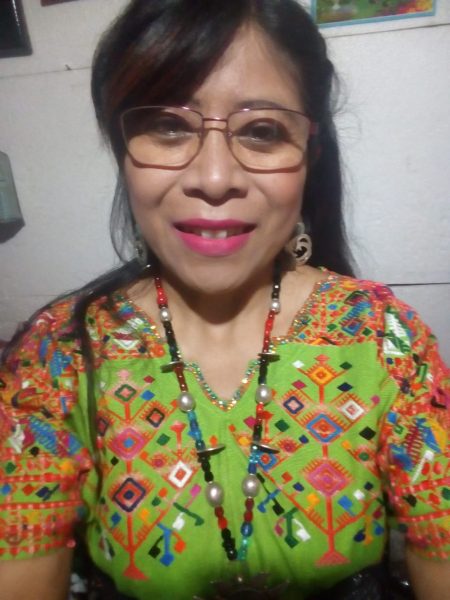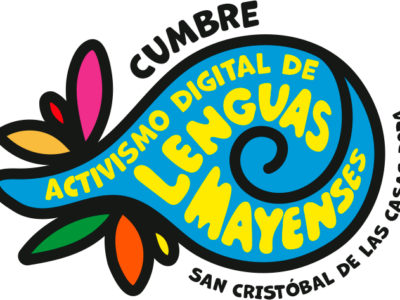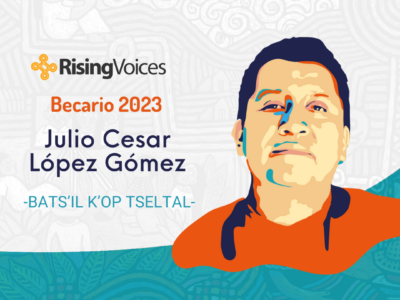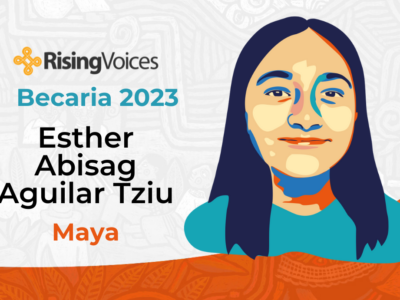
Photograph shared by Elena Tambriz
In 2020, we continue our social media campaign by inviting different hosts to manage the @ActLenguas (Language Activism) Twitter account and share their experiences with the revitalization of and advocacy for native languages. This profile post is about Elena Tambriz (@elena_tambriz) and what she plans to discuss during her week as a host.
Rising Voices (RV): Please tell us about yourself.
De Guatemala, Elena Tambriz, K’iche’ Maya, Intérprete, Traductora y Cantautora. Fluente en tres idiomas: K’iche’ Maya, Español e Inglés.
Soy del municipio de Nahualá departamento de Sololá, Guatemala. Pertenezco a la etnia k’iche’ Maya. Mis estudios básicos y diversificados los realicé en Instituto Socorro de Antigua Guatemala, luego fui muy afortunada en ganar una beca para estudiar por dos años una técnica en Hocking College, Ohio, USA.
Soy traductora: He localizado numerosas traducciones desde el inglés a mi querido idioma k’iche’ Maya. Entre estas traducciones cabe mencionar Facebook, Windows, Xbox, Bing, Mozilla Nativo, Skype y demás software de las redes sociales más utilizados en el mundo incluidos contenidos sobre bancos, clima, viajes, deportes, comida y otros.
Quiero manifestar que me da tanta honra y me siento satisfecha de tener la oportunidad de traducir muchos términos a mi querido idioma k’iche’ porque de esta forma estoy logrando apoyar a conservar, divulgar y valorar mi idioma nativo.
También desde el 2012 estoy trabajando como intérprete en una empresa de los Estaos Unidos. Interpreto al k’iche’ maya para quienes no entienden el Inglés o el Español. Me siento muy afortunada de poder apoyar a mi gente de esta forma.
My name is Elena Tambriz, I am K’iche’ Mayan from Guatemala. I am an interpreter, translator and singer-songwriter. I am fluent in three languages: K’iche’ Mayan, Spanish and English.
I am from the municipality of Nahualá, department of Sololá, Guatemala. I belong to the K'iche’ Mayan ethnic group. I did my basic and specialized studies at the Instituto Socorro in Antigua, Guatemala. Then, I was very lucky to win a two-year scholarship to study for a technical skills degree at the Hocking College, in Ohio, USA.
I am a translator. I have done numerous translations from English to my beloved K'iche’ Mayan language. These translations are about Facebook, Windows, Xbox, Bing, Mozilla in native languages, Skype and other widely-used social networking software, including content on banks, weather, travel, sports, food and other topics.
I am very honored and glad to have the opportunity to translate many terms into my beloved K'iche’ language because in this way I support the preservation, dissemination and appreciation of my native language.
Since 2012 I have been also working as an interpreter for a company in the United States. I do interpreting to K’iche’ Mayan for those who do not speak English or Spanish. I feel very fortunate to be able to support my people in this way.
RV: What is the current status of your language on the internet and offline?
Afortunadamente hay diferentes empresas y organizaciones que están impulsando el activismo digital en internet en diferentes idiomas mayas incluyendo mi idioma K’iche’ maya, gracias a @ActLenguas que me está dando el espacio de dar a conocer y compartir cosas relevantes sobre mi querido idioma k’iche’ maya.
“Activismo digital en lenguas indígenas”: Acciones en favor de los idiomas mayas. En el marco del proyecto “Activismo digital en lenguas indígenas” impulsado por Rising Voices y en alianza con Pueblo CLICK, se llevó a cabo un Encuentro de Activismo Digital de Idiomas Indígenas, específicamente del idioma kaqchikel, realizado el 11 y 12 de abril de 2017 en las instalaciones del Centro Educativo Pavarotti en San Lucas Tolimán, Sololá, que logró convocar a más de 30 activistas procedentes de distintas regiones de Guatemala.
Al mismo tiempo hay varios canales donde se transmiten conocimientos básicos sobre la gramática del Idioma K’iche’ maya, sobre la cultura y sobre la espiritualidad.
Fuera de línea: Hace unos cuantos años que el Ministerio de Educación de Guatemala, implementó los idiomas mayas en los cursos de la primaria y secundaria. Muchos niños que habían perdido su idioma por muchas razones, ahora tienen la oportunidad de aprenderlo en la escuela.
Fortunately, there are different companies and organizations that are promoting digital activism in different Mayan languages, including my K'iche’ Maya language. I thank the @ActLenguas initiative which is giving me the space to make known and share relevant things about my beloved K'iche’ Mayan language.
“Digital activism in indigenous languages”: Actions in favor of the Mayan languages. Within the framework of the project “Digital activism in indigenous languages” promoted by Rising Voices and in cooperation with Pueblo CLICK, a Meeting of Digital Activism of Indigenous Languages, specifically of the Kaqchikel language, was held on April 11 and 12, 2017 at the Pavarotti Educational Center in San Lucas Tolimán, Sololá, which gathered more than 30 activists from different regions of Guatemala.
At the same time, there are several other ways to promote basic knowledge about the grammar of the K'iche’ Mayan language, culture and spirituality.
For example, a few years ago, the Guatemalan Ministry of Education took the initiative to implement teaching Mayan languages courses in primary and secondary schools. Many children who, for many reasons, had lost their language, now have the opportunity to learn it at school.
RV: On what topics do you plan to focus during the week that you’ll manage the @ActLenguas Twitter account?
- Idiomas mayas de Guatemala.
- Experiencia como Intérprete, Traductora y Cantautora en k’iche’ Maya
- Videos sobre gramática y pronunciación en K’iche’ Maya.
- La poesía maya principalmente poemas del célebre poeta: Humberto Ak’ab’al
- Espiritualidad Maya
- Importancia del Activismo digital y la tecnología en los Idiomas nativos.
- Trajes típicos de Guatemala.
- Principales costumbres y tradiciones Mayas.
I plan to focus on the following topics:
- Mayan languages of Guatemala
- My experience as an interpreter, translator and singer-songwriter in K’iche’ Mayan language
- Videos about grammar and pronunciation in K’iche’ Mayan
- Mayan poetry, mainly by the famous poet Humberto Ak’ab’al
- Mayan spirituality
- The importance of digital activism and technology in native languages
- Traditional Guatemalan costumes
- The main Mayan customs and traditions.
RV: What are the main motivations for your digital activism, and your hopes for your language?
Mi motivación principal es el rescate, la divulgación y valoración de mi querido Idioma k’iche’ ya que los idiomas son el respiro de las comunidades, el pilar fundamental sobre el cual se sostiene la cultura, quien conoce y habla su idioma conoce su mundo y su cosmovisión. El Idioma es la manifestación de la vida de los pueblos.
Sueño en un futuro que los Idiomas mayas y todos los idiomas nativos logren un gran porcentaje de rescate y recuperen su valor como tal y que a través del activismo digital y de muchas otras iniciativas en pro de los idiomas nativos se logre la transmisión de generación en generación Un paso importante para alcanzar la igualdad lingüística, es el reconocimiento de los Idiomas como idiomas oficiales Ante este hecho, es urgente y necesario ampliar los usos de los idiomas en todos los niveles (político, económico, educativo, religioso, etc.). El Estado debe contribuir al desarrollo, promoción y mantenimiento de los mismos.
My main motivation regards the rescue, dissemination and appreciation of my beloved K'iche’ language. I believe languages represent the life of communities, the fundamental pillar that maintains a culture. Knowledge of one's language means a knowledge about one's worldview. Language reveals peoples’ lives.
I dream that the Mayan languages and all the native languages will be rescued and will recover their value, and that through digital activism and many other initiatives supporting native languages they will be transmitted from generation to generation. An important step to achieve linguistic equality is the recognition of native languages as official languages. Given this fact, it is urgent and necessary to expand the uses of native languages at all levels (political, economic, educational, religious, etc.). The State must contribute to their development, promotion and maintenance.



